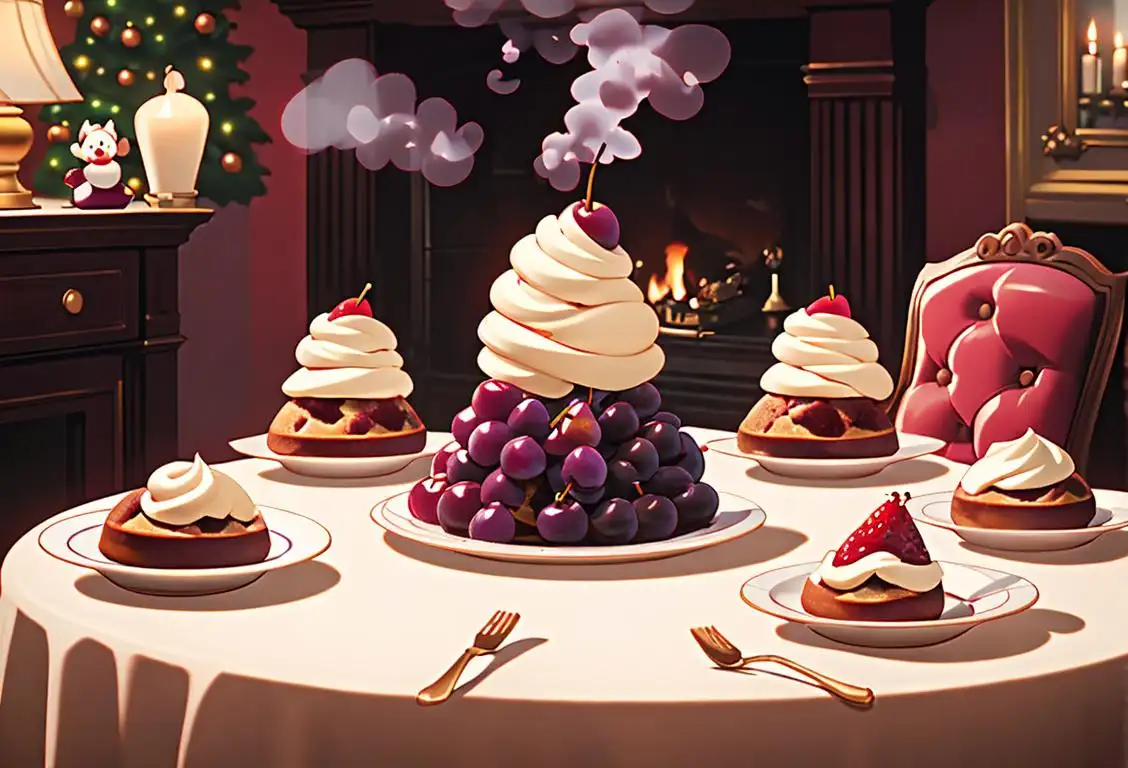National Plum Pudding Day

Hey there, pudding enthusiasts! Are you ready to dive into the delightful world of National Plum Pudding Day? Well, get your taste buds tingling and your sweet tooth primed because we're about to take an enticing journey into the realm of this delectable dessert.
When is Plum Pudding Day?
It's national plum pudding day on the 12th February.
The Sweet Origins of Plum Pudding
Legend has it that plum pudding dates back centuries ago, to a time when folks in the British Isles were celebrating Christmas in a decidedly mouthwatering manner. Originally, plum pudding was a humble concoction of suet, flour, breadcrumbs, sugar, spices, and, you guessed it, plums.
Over time, this fruity delight evolved into a more elaborate treat, with the addition of nuts, citrus zest, alcohol, and an array of dried fruits. Rumor has it that the Victorians adored this rich dessert so much that they even believed it contained magical powers! Well, we can't vouch for the enchanted properties of plum pudding, but we can certainly testify to its scrumptiousness.
Plum Pudding in the Digital Age
As people around the world continue to savor the flavors of plum pudding, the internet has become an essential gateway for sharing recipes, exchanging baking tips, and expressing undying devotion to this festive dessert. With over 500 mentions online, it's evident that plum pudding holds a special place in the hearts of many. The digital landscape has brought people together to celebrate this culinary masterpiece, making it possible for plum pudding lovers to connect with fellow enthusiasts and spread the joy of this delightful sweet treat.
Did You Know?
Did you know that plum pudding isn't actually made with plums? Shocking, right? But fear not, dear reader, it's not as scandalous as it sounds. Back in the day, when the word "plum" was used, it referred to any dried fruit. So, when you indulge in a slice of plum pudding, you're enjoying a medley of magnificent dried fruits, not just plums!
History behind the term 'Plum Pudding'
1420
The early origins
Plum pudding can be traced back to the early 15th century in England. It was originally known as 'plum porridge' and was a savory dish made with meat, wine, spices, and dried fruits, rather than the sweet dessert it is known as today. The term 'plum' was used to describe any dried fruit, not just the specific fruit known as a plum.
1650
Transformation into a sweet dessert
During the 17th century, the plum pudding went through a transformation. It became sweeter and gained popularity as a Christmas dish. The addition of flour, eggs, breadcrumbs, and more dried fruits gave it a denser texture. The flavors were enhanced with the use of spices like cinnamon, nutmeg, and cloves.
1714
George I and the Christmas Pudding
Plum pudding became firmly associated with Christmas during the reign of George I in the 18th century. Legend has it that he requested plum pudding as part of his first Christmas in England. This royal association popularized the dessert, and it became a staple on Christmas menus throughout the country.
1830
The renaming to 'Plum Pudding'
By the 19th century, the term 'plum porridge' had fallen out of use, and the dessert came to be referred to as 'plum pudding.' The term 'plum' remained even though the recipe no longer contained plums, as 'plum' had become synonymous with dried fruits. Plum pudding became a beloved symbol of Christmas festivities and tradition.
1840
The addition of coins and charms
In the mid-19th century, the tradition of adding small silver coins or charms to the plum pudding emerged. This practice was believed to bring good luck to the person who found them, and the charms symbolized various meanings. However, due to safety concerns, this practice has become less common in modern times.
1927
The importance of Stir-Up Sunday
Stir-Up Sunday, which falls on the last Sunday before Advent, became a significant day for making plum pudding. Families would gather to mix the ingredients and make a wish while stirring the mixture. Each family member would take turns to stir the pudding clockwise and make a secret wish for the upcoming year.
Present day
Continued tradition and global popularity
Plum pudding remains a cherished part of Christmas traditions in many English-speaking countries. Despite evolving recipes and variations, the essence of this rich, fruit-laden, and spiced pudding has endured over the centuries. It symbolizes warmth, togetherness, and the festive spirit, making it a much-loved dessert during the holiday season.
Did you know?
Did you know that plum pudding isn't actually made with plums?Tagged
foodFirst identified
12th February 2016Most mentioned on
12th February 2016Total mentions
524Other days
Bacon Day
Sweet Tea Day
Medal Of Honor Day
Iced Tea Day
Pumpkin Day
Guac Day
Vodka Day
Foundation Day
Cheese Pizza Day
Pina Colada Day









